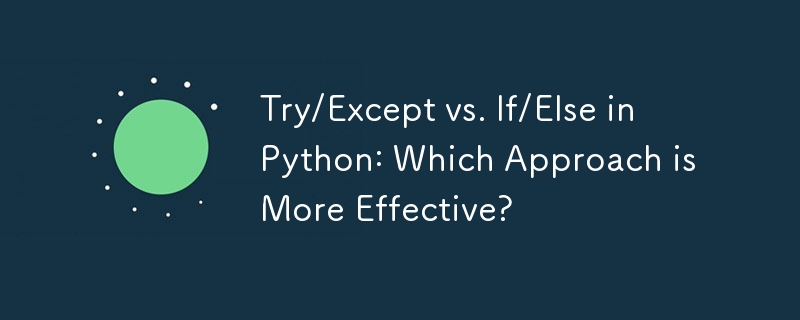

Try/Except vs. If/Else: Which Approach is Preferable?
When working with exceptions in Python, developers often face the dilemma of whether to test for validity or attempt an action and handle any resulting exception. This article delves into the nuances of each approach, providing guidance and examples to inform decision-making.
Try/Except: Embracing Exceptions
According to PEP 20, errors should never pass silently unless explicitly silenced. While this may suggest that using a try/except block to handle exceptions is acceptable, it's important to note the nature of the exception being caught.
The try/except approach is advantageous when the exception is genuinely exceptional, occurring only in rare circumstances. This allows for quicker execution by eliminating unnecessary lookups. Additionally, it aligns with Python's philosophy of EAFP (Easier to ask for forgiveness than permission).
Speed-ups and Cleaner Code
Try/except can lead to speed-ups when the exceptional case is infrequent and checking for its occurrence would require additional lookups. For instance, attempting to access an element at a specific index within a long list is faster using try/except compared to checking if the index is within bounds using if/else.
Moreover, try/except promotes cleaner code by condensing multiple conditional statements into a single block, enhancing readability and reducing the number of lines.
Example:
Consider the following code snippets:
<code class="python"># If/else approach
if len(my_list) >= 4:
x = my_list[3]
else:
x = 'NO_ABC'
# Try/except approach
try:
x = my_list[3]
except IndexError:
x = 'NO_ABC'</code>The try/except approach is more concise, avoids the extra lookup, and handles the IndexError only when it occurs.
Conclusion
While both try/except and if/else have their merits, try/except is generally preferred when it results in speed improvements, cleaner code, or handles exceptional cases without sacrificing exception visibility. By embracing exceptions and using them wisely, Python developers can create robust, readable, and efficient code.
The above is the detailed content of Try/Except vs. If/Else in Python: Which Approach is More Effective?. For more information, please follow other related articles on the PHP Chinese website!
 The difference between WeChat service account and official account
The difference between WeChat service account and official account
 How to light up Douyin close friends moment
How to light up Douyin close friends moment
 How to deal with slow computer lag and slow response
How to deal with slow computer lag and slow response
 esd to iso
esd to iso
 Introduction to php configuration files
Introduction to php configuration files
 How to clean the C drive when it turns red
How to clean the C drive when it turns red
 How to deal with garbled Chinese characters in Linux
How to deal with garbled Chinese characters in Linux
 myfreemp3
myfreemp3




